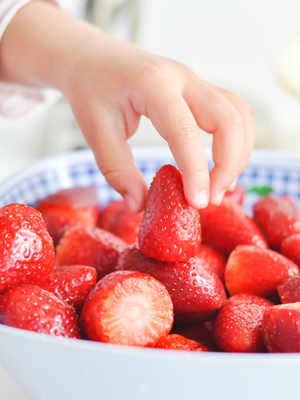
 Organic Eating and Your Children: The Benefits
Organic Eating and Your Children: The BenefitsOK, so you’ve sold yourself on the idea that organic eating is going to help you, but what about your children? The benefits are plentiful, with compelling reasons to help switch your child or children to an organic diet.
First, organic food offers more nutrients than non-organic food. That is reason enough to help your child attain the levels of nutrients needed a day through food alone. Sure, vitamin and mineral supplements can allow your child to acquire the recommended daily allowances (RDA), but is it not more superior to get them from the foods they will consume anyway? Organic foods taste better, so they will be more likely to enjoy fresh fruits and vegetables.
But even more, reasons exist. You might not have known, for example, that ridding toxins in the diet can help your child’s health. A study in the British Journal of Nutrition showed that 815 two-year-olds who ate organic dairy products had fewer incidents of eczema and wheezing than did the control group, who ate conventionally grown dairy foods. With asthma on the rise in children, this is a phenomenal result and a great reason to go organic. Of course, you should not only use organic dairy but offer your child a variety of lovely fruits and vegetables along with foods free of nasty additives.
Is your child’s mental health important? Follow the guidelines set for growth and cognitive development. An organic diet decreases the chances for depression and concentration problems in children (and adults). Your child will perform better in school, not be as tired and will work harder than other students who consume non-organic foods.
In addition, eating organic foods can help with attention deficit disorder (ADD), typical condition children have. Many times Ritalin is prescribed to help a child focus, but there can be side effects from taking this drug. Many parents hesitate to give a prescribed medication to their children to achieve a specific behavior. Who can blame them? Who knows how they will affect a child’s development? If children eat organic foods, their ADD risks are lowered dramatically because of the correlation between diet and disease. Problems arise when children consume products with high sugar and trans-fat content or toxin-filled processed foods. However, to keep your child healthy, organic foods with a high nutrient value and a limited amount of pesticides are a positive.
 Of course, not all organic food is necessarily good for your child. A plethora of sweets, cookies and snack foods are organic – but are they valuable additions to a child’s diet? Of course not. Just because a chocolate chip cookie is organic doesn’t mean it will add value to your child’s diet. Carefully watch what you feed your child or children. Fresh vegetables and fruits make a much better snack – soon, they will learn to love their taste and texture.
Of course, not all organic food is necessarily good for your child. A plethora of sweets, cookies and snack foods are organic – but are they valuable additions to a child’s diet? Of course not. Just because a chocolate chip cookie is organic doesn’t mean it will add value to your child’s diet. Carefully watch what you feed your child or children. Fresh vegetables and fruits make a much better snack – soon, they will learn to love their taste and texture.
Studies have shown that the number of toxins a child eats can really impact their health. For example, American children consuming organically grown foods have less than one-sixth the pesticide residues in their urine than those who eat conventionally grown foods. A study in Mexico showed a higher growth rate in children who ate organically than children from a neighboring village who did not. When you breastfeed, choosing to eat organically has similar benefits for your child’s development; then, as the baby grows and their diet expands, the choice to feed organic becomes more critical because of the research; this is the food you can prepare yourself.
Hands down, research and common sense show children who have a regular diet of organic foods will be healthier than those who don’t. So why take chances? Segue into an organic lifestyle today!
Fresh Reading
If you have any questions or would like to schedule an on-site visit, please call us. We look forward to meeting you and your little child!
Address: 5290 Shawnee Rd. #101, Alexandria VA, 22312
Phone: (703) 559-3361
Copyright © Yellow Tulip Academy. All Rights Reserved. Websites for Daycares.